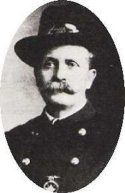Bill Tilghman
| Bill Tilghman | |
|---|---|

Tilghman in 1912
|
|
| Born |
William Matthew Tilghman, Jr. July 4, 1854 Fort Dodge, Iowa |
| Died | November 1, 1924 (aged 70) Cromwell, Oklahoma |
| Cause of death | Firearm discharge |
| Resting place | Oak Park Cemetery in Chandler, Oklahoma 35°42′01″N 96°54′16″W / 35.700278°N 96.904444°W |
| Residence | Chandler, Oklahoma |
| Citizenship | US |
| Education | No formal education |
| Occupation | Buffalo hunter, saloon owner, Deputy U.S. Marshal, Oklahoma state senator, Oklahoma City police chief, film director and actor |
| Years active | 1869–1924 |
| Known for |
|
| Political party | Democratic |
| Spouse(s) |
|
| Children | Charles, Dorothy, William, and Vonia Tilghman |
William Matthew "Bill" Tilghman, Jr. (July 4, 1854 – November 1, 1924) was a career lawman and gunfighter during the Wild West days of Kansas and Oklahoma. He was city marshal in Dodge City, participated in the Kansas County Seat Wars, and moved on to Oklahoma where he participated in the land rushes, including the Cherokee Strip Land Rush. He served as a Deputy U.S. Marshal in Oklahoma and was celebrated for capturing the outlaw Bill Doolin. Tilghman never achieved the household-word status of his close friends Wyatt Earp and Bat Masterson but released his memoirs in a film that he directed and starred in as himself. He died at the age of seventy, after being shot down on the streets of Cromwell, Oklahoma. The fame that Bill Tilghman did achieve was largely due to the efforts of his second wife, who wrote his biography in 1949.
William Matthew Tilghman, Jr. was born on July 4, 1854, in Fort Dodge, Iowa. He was the third of six children born to William Matthew Tilghman, Sr. (1820–1908) and his wife Amanda Shepherd (1830–1915).
During 1857, the Tilghman family relocated to Kansas and settled on a farm near Atchison. At the age of seventeen, Bill Tilghman won a contract to supply buffalo meat to the men building the Atchison, Topeka and Santa Fe Railroad. From September 1, 1871, to April 1, 1872, Tilghman was supposed to have killed 3,300 buffalo. He would claim this was the "all time record" in later years. According to Zoe Tilghman, his second wife, he killed two Cheyenne braves when they confronted him, as he feared they would torture him.
According to his second wife, Tilghman first became a lawman during September 1874, when he signed on as a deputy under Sheriff Charles E. Bassett (1847–1896) of Ford County, Kansas. Despite his second wife's claim, there is no record of Tilghman serving as Bassett's deputy. Sometime during the summer 1877, 23 year-old Bill Tilghman married a 16-year-old widow named Flora (Kendall) Jefferson (1861–1900). The marriage was an unhappy one almost from the start, but nonetheless produced four children: Charles, Dorothy, William and Viona.
Early in 1877 Tilghman and Henry Garris opened the Crystal Palace Saloon in Dodge City. A local paper reported during the summer that "Garris and Tilghman's Crystal Palace is receiving a new front and an awning, which will tend to create a new attraction towards the never ceasing fountains of refreshment flowing within." During the spring of 1878, Tilghman and his partner, Henry Garris, sold the Crystal Palace Saloon.
Bill Tilghman's first documented service as a lawman began on January 1, 1878, when he became a deputy under Sheriff Bat Masterson. Within a month of his appointment, Tilghman was charged with being an accessory to an attempted train robbery. On February 12, 1878, the charges against Tilghman were dropped for lack of evidence. Tilghman was again suspected of a crime only two months later, on April 16, 1878, when he was arrested by his boss, Masterson, on a charge of horse theft. Once again the charges were dismissed. Troubles of a different sort came up on March 8, 1879, when Masterson had to sell his deputy's Dodge City house, at auction, to satisfy a judgment.
...
Wikipedia
